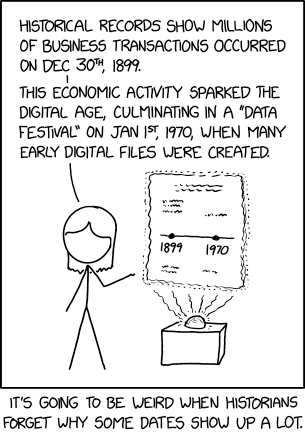

KooKoo Kids is the best kidswear clothing brand in Pakistan that offers online clothes for girls and boys from 1 to 12 years old. Grab now with up to 60% off. Visit our website https://thekookookids.com
2 public comments
An explanation, for those as puzzled as I was:
Unix-based systems traditionally represent timestamps as "seconds since 1970-01-01". If some program requires a modification timestamp for some file and no accurate value is available, it will commonly use the value 0 as a default. When other systems carefully preserve that value, it leads to files with 1970-01-01 timestamp.
Spreadsheets traditionally represent timestamps as "(fractional) days since 1900-01-01". In the same way, asking for a timestamp when no valid information is available will often get the value 0 as a default. Since businesses run on Excel, there's a lot of transaction records with a 0 timestamp in Excel spreadsheets out there.
One last wrinkle: The first wildly popular spreadsheet, Lotus 1-2-3, had a bug: it assumed that the year 1900 was a leap year, so it assumed 1900-02-29 existed, and so every date timestamp after that point was off by one. When Microsoft created Excel, they carefully reimplemented that bug for compatibility's sake, but if you're a historian looking at the data, you might reasonable assume that spreadsheets stored timestamps as "(fractional) days since 1899-12-31". If you're storing timestamps in some different format, it might not be obvious that those are zero dates - you might assume there's just a lot of transactions processed on that day.
Unix-based systems traditionally represent timestamps as "seconds since 1970-01-01". If some program requires a modification timestamp for some file and no accurate value is available, it will commonly use the value 0 as a default. When other systems carefully preserve that value, it leads to files with 1970-01-01 timestamp.
Spreadsheets traditionally represent timestamps as "(fractional) days since 1900-01-01". In the same way, asking for a timestamp when no valid information is available will often get the value 0 as a default. Since businesses run on Excel, there's a lot of transaction records with a 0 timestamp in Excel spreadsheets out there.
One last wrinkle: The first wildly popular spreadsheet, Lotus 1-2-3, had a bug: it assumed that the year 1900 was a leap year, so it assumed 1900-02-29 existed, and so every date timestamp after that point was off by one. When Microsoft created Excel, they carefully reimplemented that bug for compatibility's sake, but if you're a historian looking at the data, you might reasonable assume that spreadsheets stored timestamps as "(fractional) days since 1899-12-31". If you're storing timestamps in some different format, it might not be obvious that those are zero dates - you might assume there's just a lot of transactions processed on that day.